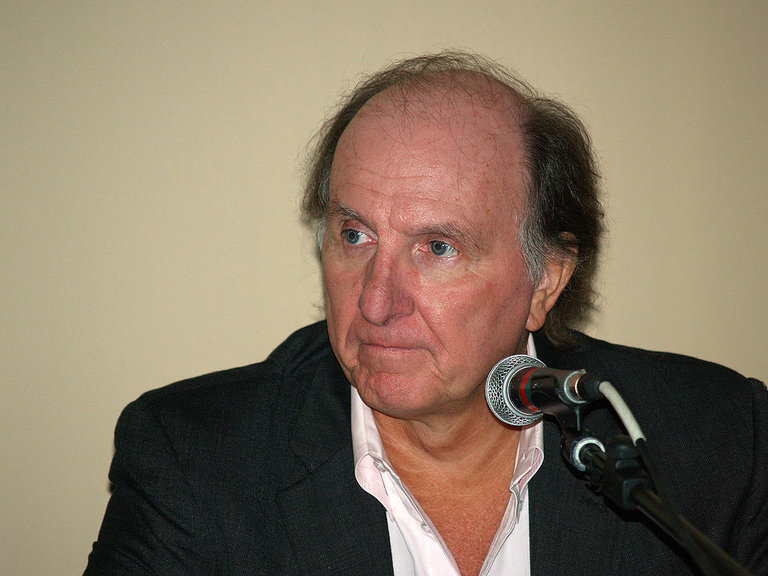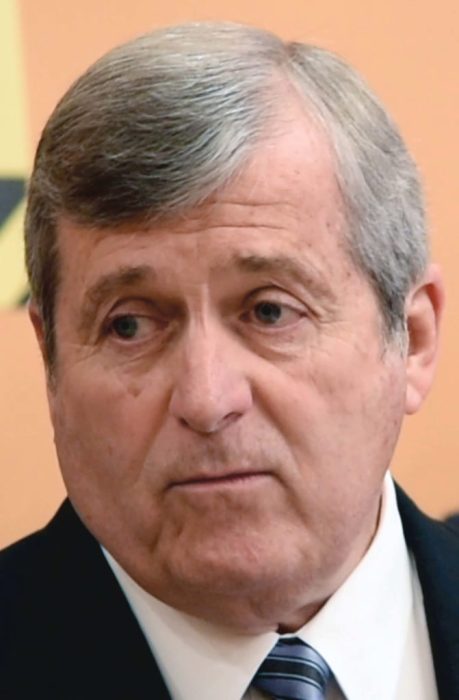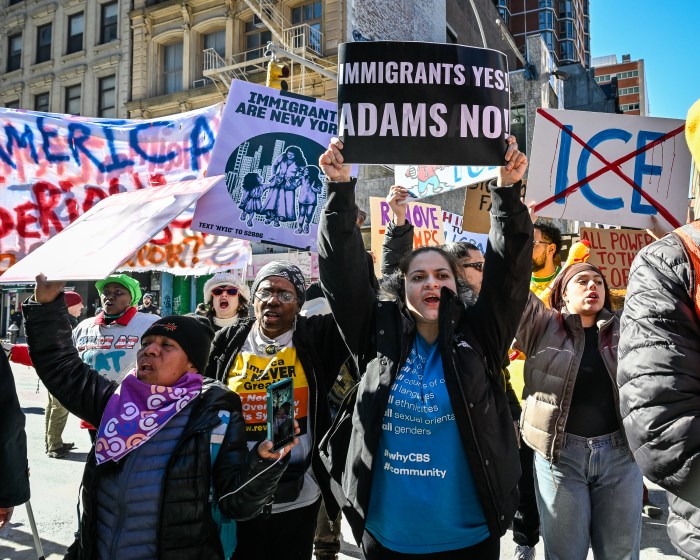The world has lost one of the greatest journalists to ever wield a pen.
Wayne Barrett, the legendary muckraker and teacher, has died; his beloved wife Fran telling media outlets due to interstitial lung disease. He was 71 years old.
As I sit and type this on the eve of the presidential inauguration amid texts and calls from friends and fellow journalists relaying the news, it dawns on me that I’m not even sure I’ll be able to finish this post, let alone write something that even comes close to encapsulating what Wayne Barrett has meant to me, countless other journalists, or journalism itself.
It sort of feels like a shotgun blast to the chest, actually. I don’t want to overstate or understate Wayne’s impact on me, his mastery of the craft of investigative journalism, or his unquantifiable influence on legions—and I mean legions—of others. I just feel I owe it to him to at least try and write something, anything, to even partially convey his significance and how many people he’s touched, with the minimal prospect of inspiring even just one other person who perhaps didn’t know him to learn more about his life and work.
Wayne Barrett spent nearly 40 years at the alt-weekly Village Voice, was a fellow at the Nation Institute, and a frequent contributor to The Daily Beast and New York Daily News. Throughout his career he exposed corruption and malfeasance of nearly every kind, and in recent years he’s rightfully been recognized as one of, if not the, foremost authorities on Donald Trump.
Wayne was my master’s thesis advisor at Columbia University Graduate School of Journalism in the inaugural class of the school’s Toni Stabile Center for Investigative Journalism. He’d graduated from the school in 1968 and served as an adjunct professor there for decades. A massive fan of the Voice and an aspiring muckraker myself here at the alt Long Island Press, I’d known some of his exposés before heading into the program, mostly his epic, epic reporting about Rudy Giuliani.
Speaking truth to power and holding the powerful accountable, no matter their party affiliation, was Wayne’s forte, and his books—among them, Rudy! An Investigative Biography of Rudolph Giuliani (2001), Grand Illusion: The Untold Story of Rudy Giuliani and 9/11 (2006), 1992’s Trump: The Deals & The Downfall, and its 2016 republication Trump: The Greatest Show On Earth: The Deals, The Downfall, The Reinvention—should be mandatory reading for anyone, journalist or not.
Wayne was already a hero to me, and I was star-struck. You can imagine, then, how absolutely floored I was when on our first introduction, in front of the center’s larger class, he commended me on some of my own investigative dabblings. I’d soon learn that research, research, research was one of his hallmarks—something he’d cement within me, too—the hard way, at times. His words that day inspired me to want to learn as much as I possibly could about investigative journalism, and to do better. He might as well have dumped barrels of gasoline on an already seething fire.
Wayne Barrett was a force of nature. He was the epitome of what a journalist should aspire to be. He was a truth-teller in every aspect of the word. Dogged, relentless, tenacious, terrifyingly ferocious—pick an adjective or superlative relaying unparalleled investigative bloodthirst for the truth and put it in front of his name. His anger and outrage was literally the stuff of legends; I think anybody privileged enough to have known or studied under him would attest to that. His passion was infectious.
Wayne possessed a fury and a determination and a dedication to getting at the core of a story I’ve just never witnessed before to that scale, in anyone. (God help you if you missed a deadline or an objective during your master’s thesis; well over six feet tall, Wayne was also physically imposing, and could be very intimidating.) He owned New York City, and was feared and revered.
When I say he impacted and inspired “countless” others, I mean countless. Legions went on to conduct investigative journalism a la Wayne Barrett, as a direct result of his influence. I got a rare glimpse of just how many at a gathering for him a few years ago, where I met some of his infamous gangs of interns, both former and current, who he’d throw right into the investigative fire and disperse across the city to hunt down sources, research critical data and interrogate and confront targets of his equally countless probes.
Good luck if you were on their visitation list.
Plus, there’s a definite Wayne Barrett Domino Effect. Those influenced by him, influence others, and so on and so forth, ad infinitum. Well the room that night was full of hellraisers. Two off the top of my head included Wayne’s close friend and fellow investigative journalism heavyweight Tom Robbins—who left the Village Voice in solidarity with Wayne when he was unceremoniously let go in 2011, and who’s currently investigative journalist in residence at CUNY Graduate School of Journalism—and former Voice bloodhound and Wayne Barrett intern Bill Bastone, of document treasure trove TheSmokingGun.com. I think Bastone hosted the get-together.
It was a celebration of Wayne, and there were a lot of laughs as well as a ton of stories. Throughout the night, guests, in their own ways, took turns telling him how much he meant to them, how much they learned from him, and how much he changed their lives. But just being there seemed to be recognition enough for the guest of honor.
It is literally impossible for me to list every little thing about journalism that I learned from Wayne. You learned lifetimes’ worth literally just sitting in the same room with the guy and talking about stories, or through his books and articles, listening to him recall tales and techniques from the frontlines in the field, or even just talking to someone else about him.
He taught us to dig. He taught us to question. He taught us to leave no stone unturned, to be fearless, and to never give up. Some of this he taught simply by being himself, simply by being Wayne. Leading by example.
The man was a legend, in the truest sense of the word. Nobody else like him. Never will be again.
It’s because of Wayne that I learned of another investigative warlord, Jack Newfield, and City for Sale: Ed Koch and the Betrayal of New York, which they wrote together.
And I remember bringing up Newfield to Wayne one afternoon when we were alone in an office at Columbia going over a stage of my thesis, and I could tell that just the mere mention of Newfield’s name sparked something inside him. It’s hard to explain, but there was a definitive vibe I picked up on almost as immediately as I enunciated those three syllables, a subtle, visceral, guttural reaction.
Respect, admiration, reverence, love—what exactly came to Wayne’s mind at that precise moment, I’ll never know, but I do know that just the thought of Jack Newfield, his mentor and friend, touched him, deeply.
I know I’ll feel something similar when somebody mentions Wayne Barrett.
I came upon the following excerpt from an obituary Wayne wrote about Newfield upon his death in 2004:
“We still feel his hand guiding us whenever our fingers hit the keys. We will hear his whispered advice for thousands of stories yet to be written: Discover. Dissect. Dig. Track. Reveal. Confront. Besiege. Level. Care…”
These same words apply to how I feel about its author. I know he’s still here, guiding us, and he will live on in our words, stories and deeds. He’s at every door we knock on, beside every source we interview, every lead we chase down.
I know this. I feel this. I believe this.
I’m sure I’ll write more about Wayne at another time—it’s hitting me now as I write this that everyone who’s ever known him should, as often as possible—but right now, I just can’t stop thinking about him and wishing I’d spent more time with him, learning from him, getting to know him more.
A friend and fellow journalist just called and shared the sentiment that one of the most tragic things about all this is that he leaves us when this industry, this craft, this world, needs him the most—bizarrely, fatefully, perhaps, mere hours before one of his greatest investigative muses ascends to the most powerful position in the free world.
This same friend called a few months ago and feverishly laid out his plan to crowdfund an independent investigative news outlet consisting of Wayne Barrett and a team of disciples that would syndicate its discoveries in newspapers and media outlets across the country, maybe the globe. It was an idea I actually think he had a few years prior.
He believed, as I and so many others do, that Wayne’s brand of fearless, relentless, investigative journalism is not only necessary, but absolutely mission-critical, so much so that the public would fund it—the very notion itself testament to Wayne’s undying impact, inspiration, influence.
As long as we continue to share these tales, and talk about him, and follow his lead, Wayne’s not going anywhere.
In fact, it’s as if he’s simply passing the torch.
It’s up to us to keep his fury and outrage and dedication to shining a light on the darkest places and people and misdeeds alive, raging and burning and scorching and illuminating, and to continue digging, digging, digging for the core, the heart, the soul: the truth.
Wayne would want it that way. No, he demands it.
Wayne Barrett, 1945-2017


























